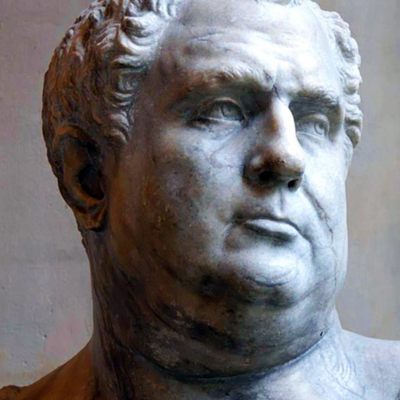Chapters
| Name | Aulus Vitellius |
|---|---|
| Ruled as | Aulus Vitellius Germanicus Imperator Augustus |
| Reign | 3 January 69 – 21 December 69 CE |
| Born | 24 September 15 CE |
| Died | 21 December 69 CE |
Vitellius was born on September 24, 15 as Aulus Vitellius. Son of Lucius Vitellius, a three-time consul (in the years 34, 43 and 47 CE), and of Sextilia. His father also served as a censor in 47 CE. After the first consulate, he became the governor of Syria. He served as censor and consulates with Emperor Claudius. During Claudius’ expedition to Britain, Lucius was in charge of the state during the emperor’s absence. Regarding the origin and social status of Vitellius, there are various legends of Suetonius.
He spent his childhood and early youth on the island of Capri, at the imperial court of Tiberius.
Vitellius held the office of consul for the middle of 48 CE, after which he was replaced by his brother Lucius. In the years 60-61 CE, he was proconsul in Africa, where he demonstrated exceptional integrity for two years. Later he obtained the office of overseer of public buildings in Rome. In December 68 CE he became the commander of the legions in Lower Germania, where he was very favourably received by the military, main thanks to the memory of his father’s merits and his indulgence towards the soldiers.
He was made emperor by his troops (under the command of Fabius Valens) on January 2, 69 CE in the provincial capital of Colonia Agippinensis (today’s Cologne, Germany). After gaining support from the troops of Upper Germania, he assumed the title of Germanicus. Vitellius, wanting to seize power over the entire empire, before he himself went to Rome, sent a 40,000-strong army under the command of Fabius Valens to take control of Gaul.
Vitellius troops (30,000, led by Alienus Caecina) marched on Rome against Emperor Galba, but on January 15, Galba was killed and the new emperor became Marcus Salwius Othon. On the Po River, near Bedriacum (now Cremona), a battle took place on April 14, 69 CE, which Otho lost and then committed suicide on April 16. After the victory of his legions, Vitellius left for Rome.
Reign
Year of the Four Emperors
Rivalry for power after his death in 68 CE Nero, the last representative of the Julio-Claudian dynasty.
After entering Rome, Vitellius assumed the highest priestly office and made himself a permanent consul. he wanted to follow the example of Nero in exercising power. His rule was characterized by great extravagance in the field of palace life. He feasted all the time. He ate at least three times a day. It had breakfast, dinner, supper and feasts. He often vomited so that he could eat more and more.
The variety and quantity of the dishes exceeded the concept of an ordinary Roman. The records include a feast where 2,000 of the finest fish and 7,000 of various birds were served. Vitellius wanted to live like no one before him. The Golden House built by Nero, full of ornaments and splendour, he considered poor. It has been calculated that during his entire reign, about 900 million sesterces1 were spent on the personal interests of the ruler.
Death
However, not all of them submitted to the new emperor. Antony Primus (commander of the 6th Pannonia Legion) and Cornelius Fuscus (Proconsul from Illyricum) decided to conquer Italy using the Danube legions (about 30,000 soldiers). On October 24, 69 CE a battle took place near Bedriacum, which Vitellius’s army lost, and the city was seized and destroyed.
The fighting continued until December when the Danube legions reached Rome. During this time, Vitellius made a deal with his brother Vespasian, Flavius Sabinus. According to it, he was to save his life in exchange for a hundred million sesterces. He then made two public statements about his resignation from the throne. However, at the persuasion of the crowds, he repeatedly took up his spirit and took up a fight with Flavius Sabinus and the followers of Vespasian in the city.
Vitellius led through the streets of Rome by the people, Georges Rochegrosse[/ramka_ze_zdjeciem ]Ultimately, the city was conquered, and Vitellius was tortured and thrown into the Tiber on December 22, 69 CE at the age of 54.
Marriages and children |
|









